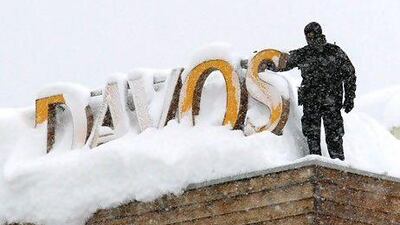In my (admittedly limited) experience, Istanbul is a far better venue for a World Economic Forum (WEF) than Davos.
The Swiss Alpine resort is, of course, the birthplace of the WEF and its spiritual home but it must rank as the most impractical place on Earth to hold a gathering of the size of the annual January bash there.
It's not only the weather, though this year's European cold snap and deluges of snow made getting round the place a daily trial, it's also the fact that a small town like Davos gets inundated by the WEF to the extent that no other life exists during the forum.
It becomes rather like a Disney World all of its own, cut off from the rest of the universe.
There is no chance of that happening in Istanbul.
The city on the Bosphorus is as different from stuffy Davos as can be. While the life of every burgher of the Swiss town is affected by the annual event, citizens of Istanbul barely notice there is a WEF going on.
The taxi drive from Ataturk airport to the conference centre proved the point. Black limos transporting powerful leaders of world opinion were held up while local people double-parked on the corniche road that runs alongside the Sea of Marmara, and held what seemed like a mass picnic, with barbecues, children's games and rasping Turkish music.
Nobody noticed the backed-up convoy of the movers and shakers.
---
The Istanbul WEF is the biggest of the string of gatherings that pave the way for the Swiss grand finale. Taking in Europe, central Asia and the Middle East, this year it replaces the separate forums that used to be held in those three regions, forming what WEF officials call a "mega-region".
But how did Turkey get the right to stage such a huge gathering?
Some participants say it reflects the sometimes troubled history between the WEF and Recep Tayyip Erdogan, the Turkish prime minister. In 2009, he caused a stir by walking offstage during a debate with the Israeli president Shimon Peres.
Relations between the Turks and the WEF have been prickly ever since. The organisation, so the story goes, decided to give Turkey a huge geographical dominion in exchange for their agreement to participate again.
That may be apocryphal, as no doubt is the whispered suggestion that the scope of the forum reflects Turkish ambitions to recreate the Ottoman Empire.
However, the main networking hall at the WEF is dominated by a large and obviously very valuable map in Arabic showing the Turkish domains at the height of Ottoman power in the 17th century.
I asked one of the Turkish helpers to translate it for me, but she replied: "We don't speak Arabic any more." Her English, however, was flawless.
---
I can't recall the last time I was turned away from a drinks party, before the Istanbul WEF. The invitation, as far as I was concerned, was loud and clear: "Opening reception, hosted by Dogus Group, by the pool in the Swissotel." There was no indication at all that a journalist might not be welcome. Transparency and media friendliness are, after all, the guiding lights of the WEF.
But just as I was about to enter the pool area, a twitchy Turkish security man saw my badge and, with a heavy arm across my chest, said: "No media".
Not wanting to fight on this occasion, I retired with an American colleague to the terrace of the Café Swiss and there had refreshment, and also a bird's eye view of what was going on by the pool.
When the band started up a tango number, and the WEFers began to slip and slide across the dance floor, we both decided it was much better to be little children outside the sweetshop, noses pressed up against the window pane, than down in that embarrassing mass.

